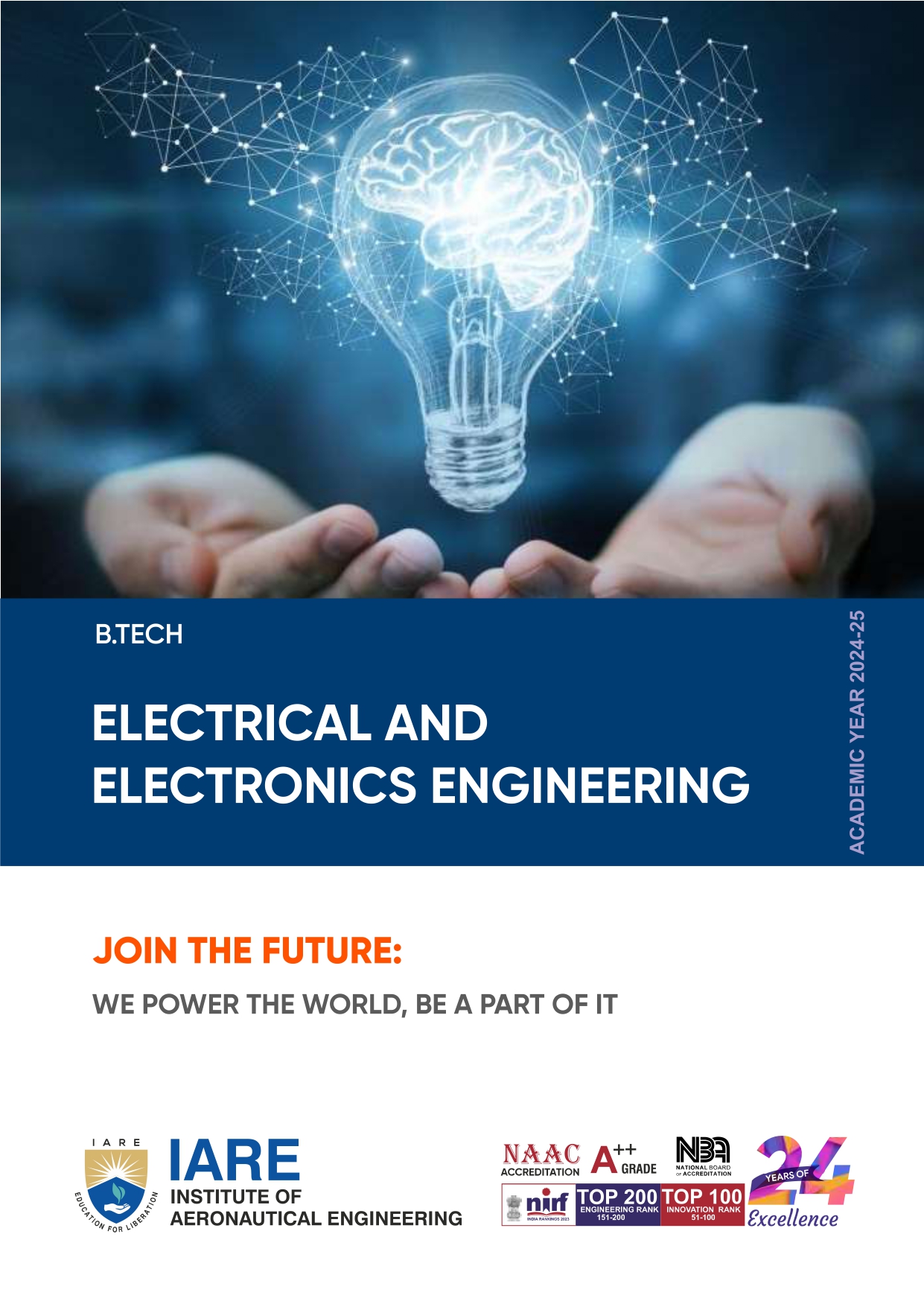Honours and Minor
An honour is the field in which a student focuses during the course of his/her degree. An Honours degree typically refers to a higher level of academic achievement in the major area. Minor is a secondary concentration of courses that often complements the honours. Minor are coherent sequences of courses which may be taken in addition to the courses required for the B.Tech degree.
Honours Certificate for Vertical in his/her OWN major for Research orientation; Minor in any OTHER branch for Improving Employability.
Only students having no credit arrears and a CGPA of 7.5 or above at the end of the fourth semester are eligible to register for B.Tech (Honours / Minor). After registering for the B.Tech (Honours / Minor) program, if a student fails in any course, s/he will not be eligible for B.Tech (Honours / Minor).
HONOURS IN ELECTRICAL AND ELECTRONICS ENGINEERING
Honours Offered in 2024 - 2025
| S.NO |
COURSE CODE |
NAME OF THE COURSE |
SEMESTER |
NPTEL LINK |
CREDITS |
| 1 |
HEED01 |
Probability Foundations for Electrical Engineers |
V |
View |
3 |
| HEED02 |
Electronic Systems Design: Hands-on Circuits and PCB Design with CAD Software |
V |
View |
| 2 |
HEED03 |
Economic Operations and Control of Power Systems |
V |
View |
3 |
| 3 |
HEED04 |
Modeling, Analysis and Estimation of Three Phase Unbalanced Power Network |
VI |
View |
3 |
| 4 |
HEED05 |
Smart Grid: Basics to Advanced Technologies |
VI |
View |
3 |
| 5 |
HEED06 |
Power Electronics Applications in Power Systems |
VII |
View |
3 |
| 6 |
HEED07 |
Design of Photovoltaic Systems |
VII |
View |
3 |
| 7 |
HEED08 |
Technical Paper Writing |
VIII |
--- |
2 |
| TOTAL CREDITS |
20 |
Honours Offered in 2023 - 2024
| S.NO |
COURSE CODE |
NAME OF THE COURSE |
SEMESTER |
NPTEL LINK |
CREDITS |
| 1 |
HEEC01 |
Computer-Aided Design of Electrical Machines |
V |
View |
3 |
| HEEC02 |
Power Management Integrated Circuits |
V |
View |
| 2 |
HEEC03 |
State space Approach to Control System Analysis and Design |
V |
View |
3 |
| 3 |
HEEC04 |
Power System Engineering |
VI |
View |
3 |
| 4 |
HEEC05 |
Smart Grids: Basics to Advanced Technologies |
VI |
View |
3 |
| 5 |
HEEC06 |
Operation and Planning of Power Distribution Systems |
VII |
View |
3 |
| 6 |
HEEC07 |
VLSI Physical Design with Timing Analysis |
VII |
View |
3 |
| 7 |
HEEC08 |
Technical Paper Writing |
VIII |
--- |
2 |
| TOTAL CREDITS |
20 |
Honours Offered in 2022 - 2023
| S.NO |
COURSE CODE |
NAME OF THE COURSE |
CREDITS |
| 1 |
HEE001 |
Engineering Optimization |
3 |
| HEE002 |
Neural Networks and Fuzzy Logic |
| 2 |
HHS001 |
Research Methodologies |
2 |
| 3 |
HEE003 |
AI Techniques in Power Systems |
3 |
| 4 |
HEE004 |
Swarm Intelligence Techniques in Power Systems |
3 |
| 5 |
HEE005 |
Data Science and MI in Power System |
3 |
| 6 |
HHS002 |
Technical Paper Writing |
3 |
| 7 |
HEE006 |
Interdisciplinary course as suggested by institute (MOOCS) |
3 |
| TOTAL CREDITS |
20 |
Honours Offered in 2021 - 2022
MINOR
The philosophy behind Engineering as an academic discipline has been to orient the knowledge seekers in a manner that shatters the theoretical boundaries and pushes them into the realms of a practical world view.
The focus of the institute always been to orient the students towards the technologies that shall drive the world in the years to come; with this philosophy the institute has decided to launch the Bachelor of Technology in a particular branch with minor in a specified program.
The Bachelor of Technology (B. Tech.) with Minor program focuses on the fundamental principles of multiple Engineering disciplines, critical and analytical thinking and the ability to develop a distinctive approach to the interdisciplinary problems.
Objectives
The key objectives of offering B. Tech. with Minor program are:
- To expand the domain knowledge of the students in one of the other branches of engineering.
- To increase the employability of undergraduate students keeping in view of better opportunity in interdisciplinary areas of engineering & technology.
- To provide an opportunity to students to pursue their higher studies in the inter-disciplinary areas in addition to their own branch of study.
- To offer the knowledge in the areas which are identified as emerging technologies/thrust areas of Engineering.
MINOR IN CSE (CYBER SECURITY)
Minor Offered in 2023 - 2024
| S.NO |
SEMESTER |
COURSE CODE |
NAME OF THE COURSE |
NPTEL LINK |
CREDITS |
| 1 |
V |
MCC001 |
Privacy And Security in Online social media |
View |
3 |
| MCC002 |
Computer Networks and Internet Protocol |
View |
3 |
| 2 |
V |
MCC003 |
Foundations of Cyber Physical Systems |
View |
3 |
| 3 |
VI |
MCC004 |
Foundations of Cryptography |
View |
3 |
| MCC005 |
Advanced Computer Networks |
View |
3 |
| 4 |
VI |
MCC006 |
Blockchain and its Applications |
View |
3 |
| 5 |
VII |
MCC007 |
Introduction To Industry 4.0 And Industrial Internet Of Things |
View |
3 |
| MCC008 |
Affective Computing |
View |
3 |
| MCC009 |
Data Analytics with Python |
View |
3 |
| 6 |
VIII |
MCC010 |
GPU Architectures And Programming |
View |
3 |
| MCC011 |
Secure Computation: Part I |
View |
3 |
| Total |
18 |
Minor Offered in 2022 - 2023
Minor Offered in 2021 - 2022
MINOR IN CSE (ARTIFICIAL INTELLIGENCE & MACHINE LEARNING)
Minor Offered in 2023 - 2024
| S.NO |
SEMESTER |
COURSE CODE |
NAME OF THE COURSE |
NPTEL LINK |
CREDITS |
| 1 |
V |
MAMC01 |
An Introduction to Artificial Intelligence |
View |
3 |
| MAMC02 |
Introduction to Machine Learning |
View |
3 |
| 2 |
V |
MAMC03 |
Reinforcement Learning |
View |
3 |
| 3 |
VI |
MAMC04 |
Artificial Intelligence: Knowledge Representation And Reasoning |
View |
3 |
| MAMC05 |
Natural Language Processing |
View |
3 |
| 4 |
VI |
MAMC06 |
Deep Learning |
View |
3 |
| 5 |
VII |
MAMC07 |
Blockchain and its Applications |
View |
3 |
| MAMC08 |
Artificial Intelligence: Search Methods for Problem Solving |
View |
3 |
| MAMC09 |
Applied Natural Language Processing |
View |
3 |
| 6 |
VIII |
MAMC10 |
Machine Learning For Engineering And Science Applications |
View |
3 |
| MAMC11 |
Deep Learning for Computer Vision |
View |
3 |
| Total |
18 |
Minor Offered in 2022 - 2023
Minor Offered in 2021 - 2022
MINOR IN CSE (DATA SCIENCE)
Minor Offered in 2023 - 2024
| S.NO |
SEMESTER |
COURSE CODE |
NAME OF THE COURSE |
NPTEL LINK |
CREDITS |
| 1 |
V |
MDSC01 |
The Joy of Computing using Python |
View |
3 |
| MDSC02 |
Parallel Computer Architecture |
View |
3 |
| 2 |
V |
MDSC03 |
Data Analytics with Python |
View |
3 |
| 3 |
VI |
MDSC04 |
Machine Learning for Engineering and science applications |
View |
3 |
| MDSC05 |
GPU Architectures and Programming |
View |
3 |
| 4 |
VI |
MDSC06 |
Business Intelligence & Analytics |
View |
3 |
| 5 |
VII |
MDSC07 |
Deep Learning |
View |
3 |
| MDSC08 |
Reinforcement Learning |
View |
3 |
| |
|
MDSC10 |
Blockchain and its Applications |
View |
3 |
| |
|
View |
18 |
| Total |
18 |
Minor Offered in 2022 - 2023
Minor Offered in 2021 - 2022
MINOR IN INNOVATION AND ENTREPRENEURSHIP (I&E)
Minor Offered in 2023 - 2024
| S.NO |
SEMESTER |
COURSE CODE |
NAME OF THE COURSE |
NPTEL LINK |
CREDITS |
| 1 |
V |
MIEC01 |
Understanding Incubation and Entrepreneurship |
View |
3 |
| MIEC02 |
Entrepreneurship Essentials |
View |
3 |
| 2 |
V |
MIEC03 |
Product Design and Manufacturing |
View |
3 |
| 3 |
VI |
MIEC04 |
Six Sigma |
View |
3 |
| MIEC05 |
Management Information System |
View |
3 |
| 4 |
VI |
MIEC06 |
Entrepreneurship |
View |
3 |
| 5 |
VII |
MIEC07 |
Product And Brand Management |
View |
3 |
| MIEC08 |
Business To Business Marketing (B2B) |
View |
3 |
| MIEC09 |
E-Business |
View |
3 |
| 6 |
VIII |
MIEC10 |
Mini Project / Launch of Marketable Product / Patent Publishing |
- |
3 |
| Total |
18 |
Minor Offered in 2022 - 2023
Minor Offered in 2021 - 2022




 Work with Us
Work with Us Campus Map
Campus Map How to Reach Us
How to Reach Us Online Degree Verification
Online Degree Verification Photo Gallery
Photo Gallery